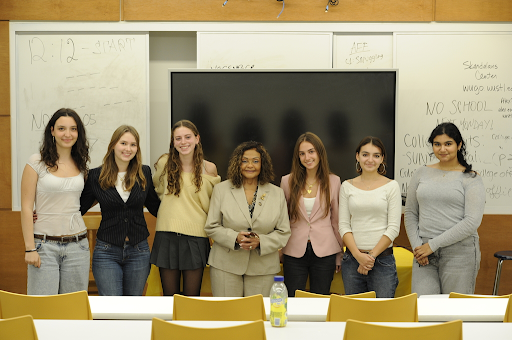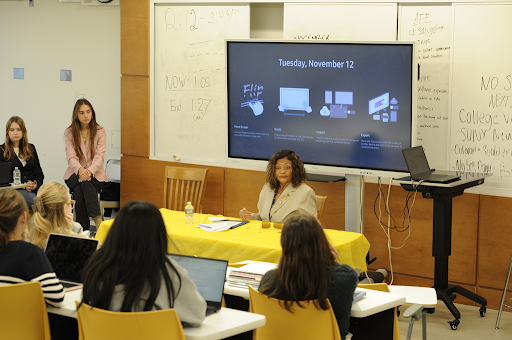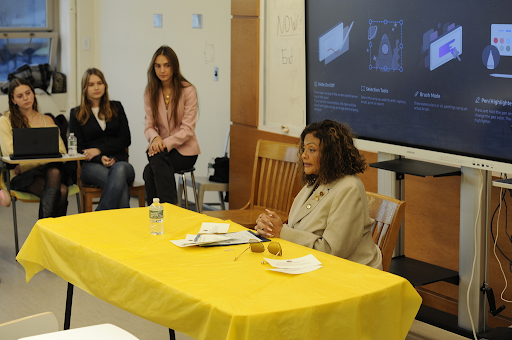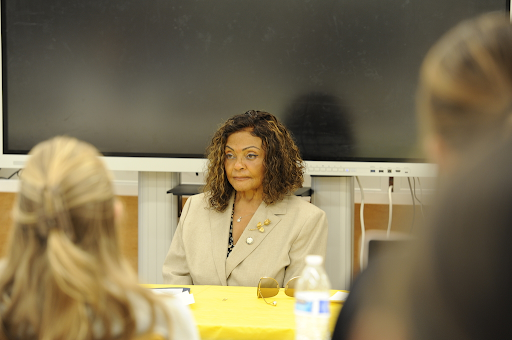On November 12th, 2024, the Bronx Science Model United Nations team held its first Women in MUN (WoMUN) Committee of the school year, reigniting a cherished tradition that has been exclusive to the team for the past six years. WoMUN is more than just an event; it’s a vital forum for young women to share their experiences and speak candidly about the gender discrimination that they have encountered in the world of Model UN — a persistent challenge that, rather than fading, demands ever-greater attention.
Last year, the tight-knit group experienced an unfortunate hiatus, casting a shadow over a community that had grown around the committee. Amidala Barta-Zilles ’25, who became involved with WoMUN during her sophomore year and is now one of its leading organizers, shared her initial disappointment. “We unfortunately couldn’t continue it for a second year [her junior year], and feeling let down by that, I expressed interest in bringing it back,” Barta-Zilles said.
Fortunately, with passionate support from a dedicated group of young women advocating for the committee’s cause, WoMUN was reinstated. Today, seven organizers champion the initiative and currently lead the charge to expand the program to the rest of the team.
While these biannual meetings are principally student-led, this iteration marked a notable shift. For the first time, WoMUN opened its doors to successful women from local politics and international relations to speak directly to the next generation of leaders. The committee welcomed its first-ever speaker, New York State Assembly Member Inez Dickens.

Assembly Member Dickens, a trailblazer in New York politics, has spent her career breaking barriers for women in politics. Representing the 70th Assembly District, she has served as a staunch advocate for underserved communities within Harlem since 2017, fighting tirelessly for affordable housing, equitable education, and workers’ rights. Her tenure has included leadership roles such as Deputy Majority Leader in the New York City Council, allowing her to shape policies promoting gender inclusion and small business development.
Her invitation to speak at WoMUN was a decision driven by the belief that “any woman that is breaking the ceiling in governmental ranks is incredibly interesting and a great resource for other women to learn from,” explained Marisa Quigley ’26, one of WoMUN’s organizers.
As the 30 plus attendees of the committee fervently awaited her arrival, a question prevailed in their minds: How could her experience overcoming challenges in a male-dominated field inspire them to become future leaders? By the end of the committee, they had their answer.
The discussion first began with the thought-provoking question on whether it is more beneficial for women to express or suppress their identity in politics. Assemblymember Dickens began to reflect on her own experience. With a wry smile, she replied, “I certainly didn’t suppress mine.”
She shared a personal anecdote about her journey, explaining that her family affectionately called her “Betty,” a nickname that followed her into her professional life. Navigating a challenging career path as a woman, the Assembly Member looked back on being appointed as a paid publisher in 2005. Ten years later, after rising to a statewide office, she recounted the dismissive comment of a man she encountered, “‘Who knew Little Betty would have done so well? And who would have thought you could do that?’” Dickens turned to the girls in the room, posing a challenge: “That’s what they think of us — ‘Little Betty.’” With pride, she pointed out that “not one of them could say they brought $100 million dollars [to the city].”
Later in the discussion, Assembly Member Dickens examined the broader implications of the 2024 election. “In the back of my mind, I felt that America had not been made for white women, [like] Hillary Clinton, and that it was highly unlikely that America was going to be ready to vote in a woman of color.” She commended the progress made in nations like India and England, where women had broken the ultimate political glass ceiling by rising to the role of prime minister. Meanwhile, the United States, Dickens argued, had lagged behind — in part due to its fortified conservative nature.
So, what could catalyze unprecedented change in America? Dickens highlighted the importance of a widespread women’s movement to reshape the political landscape. “It’s going to take a groundswell again,” she noted, reflecting on the progress made since the 1960s. She referenced past collective efforts that had enabled women to achieve groundbreaking milestones, such as becoming presidents of banks or serving in the House of Representatives.

The young women in the room asked what would be expected of them on a more local level. Assembly Member Dickens responded without hesitation. “I always [encourage] young people to get involved in their community, wherever they live, and where they can start. It doesn’t have to be a big deal,” she said. She explained the impact that youth can have often begins with involvement in local organizations, such as tenant associations, homeowners associations, or block associations. Even something as simple as a commitment to sports can make a difference. To the students in the room, it was clear that young people are capable of creating significant change through seemingly small actions. “Be active politically, know who your electors are, and start interacting with them,” Dickens added.
For Dickens, politics touches every facet of life. It was politics that dictated the issuance of birth certificates. It was politics in the 1940s that established social security. It was politics that built schools through funding. But now, it is politics that impacts housing. And it is now politics that determines which District Attorney holds power in each of the five boroughs of New York City and all the counties across New York State. “It’s all politics,” she concluded.
“We need to try to encourage our young people to get involved. Because you are not the future. You are the today, and you are the rulers of the today,” Dickens asserted.

Madalee Weissman ’25, one of WoMUN’s lead organizers, expressed her desire of leaving all of those who attend with a renewed sense of solidarity, “I just hope that all the other girls who get to experience WoMUN take something from it — feeling empowerment and the same warmth I feel when I’m surrounded by WoMUN,” she said, likening the experience to a big, warm group hug. Looking ahead, the team hopes to unite the novice and varsity members of the team in an open forum planned for April 2025, where the air will be thick with understanding and camaraderie.
WoMUN is more than just a discussion; it’s a full-circle moment where girls are inspired, draw strength from one another, and commit to driving real change. Barta-Zilles noted, “It’s a link that inspires compassion and relatability in a society where women are often pitted against one another. That’s exactly what I hope others take out of it — feeling seen. What more can anyone hope for?”
In a world where those perpetuating the issue often fail to acknowledge it, the purpose and impact of WoMUN are all the more remarkable. As Weissman put it, “Even recognizing the fact that WoMUN is special is the first step.”
“We need to try to encourage our young people to get involved. Because you are not the future. You are the today, and you are the rulers of the today,” said New York State Assembly Member Inez Dickens.

